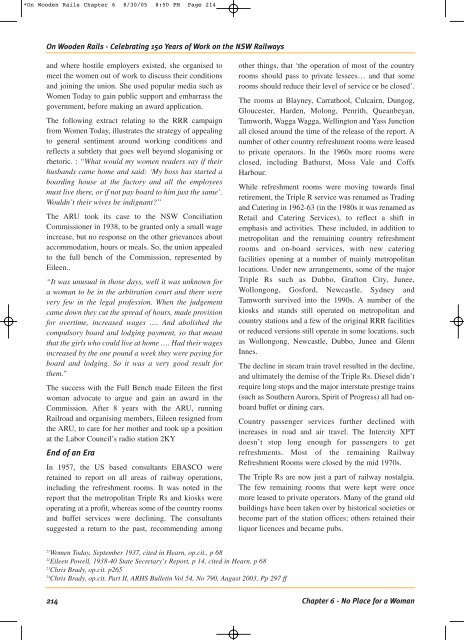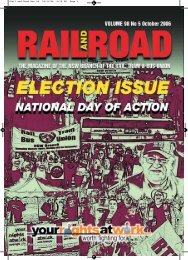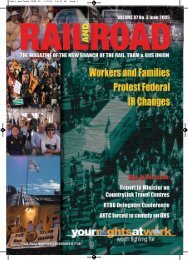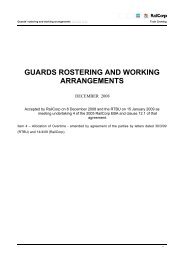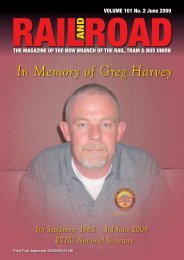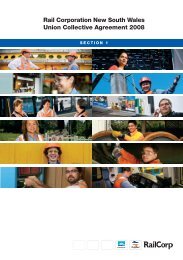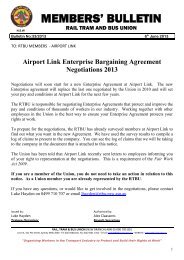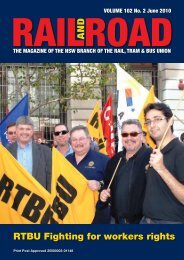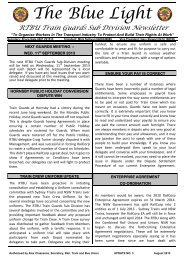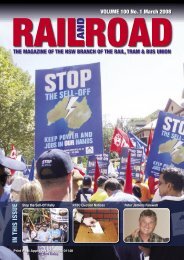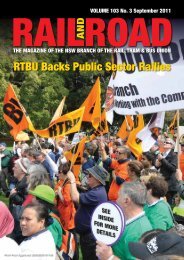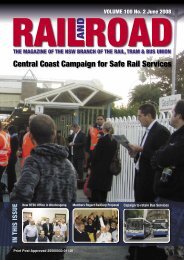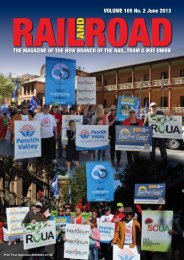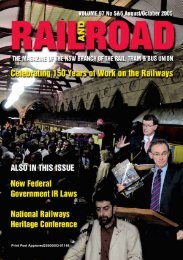Chapter 6: - Rail, Tram and Bus Union of NSW
Chapter 6: - Rail, Tram and Bus Union of NSW
Chapter 6: - Rail, Tram and Bus Union of NSW
You also want an ePaper? Increase the reach of your titles
YUMPU automatically turns print PDFs into web optimized ePapers that Google loves.
*On Wooden <strong>Rail</strong>s <strong>Chapter</strong> 6 8/30/05 8:50 PM Page 214<br />
On Wooden <strong>Rail</strong>s - Celebrating 150 Years <strong>of</strong> Work on the <strong>NSW</strong> <strong>Rail</strong>ways<br />
<strong>and</strong> where hostile employers existed, she organised to<br />
meet the women out <strong>of</strong> work to discuss their conditions<br />
<strong>and</strong> joining the union. She used popular media such as<br />
Women Today to gain public support <strong>and</strong> embarrass the<br />
government, before making an award application.<br />
The following extract relating to the RRR campaign<br />
from Women Today, illustrates the strategy <strong>of</strong> appealing<br />
to general sentiment around working conditions <strong>and</strong><br />
reflects a subtlety that goes well beyond sloganising or<br />
rhetoric. : “What would my women readers say if their<br />
husb<strong>and</strong>s came home <strong>and</strong> said: ‘My boss has started a<br />
boarding house at the factory <strong>and</strong> all the employees<br />
must live there, or if not pay board to him just the same’.<br />
Wouldn’t their wives be indignant?”<br />
The ARU took its case to the <strong>NSW</strong> Conciliation<br />
Commissioner in 1938, to be granted only a small wage<br />
increase, but no response on the other grievances about<br />
accommodation, hours or meals. So, the union appealed<br />
to the full bench <strong>of</strong> the Commission, represented by<br />
Eileen..<br />
“It was unusual in those days, well it was unknown for<br />
a woman to be in the arbitration court <strong>and</strong> there were<br />
very few in the legal pr<strong>of</strong>ession. When the judgement<br />
came down they cut the spread <strong>of</strong> hours, made provision<br />
for overtime, increased wages …. And abolished the<br />
compulsory board <strong>and</strong> lodging payment, so that meant<br />
that the girls who could live at home …. Had their wages<br />
increased by the one pound a week they were paying for<br />
board <strong>and</strong> lodging. So it was a very good result for<br />
them.”<br />
The success with the Full Bench made Eileen the first<br />
woman advocate to argue <strong>and</strong> gain an award in the<br />
Commission. After 8 years with the ARU, running<br />
<strong>Rail</strong>road <strong>and</strong> organising members, Eileen resigned from<br />
the ARU, to care for her mother <strong>and</strong> took up a position<br />
at the Labor Council’s radio station 2KY<br />
End <strong>of</strong> an Era<br />
In 1957, the US based consultants EBASCO were<br />
retained to report on all areas <strong>of</strong> railway operations,<br />
including the refreshment rooms. It was noted in the<br />
report that the metropolitan Triple Rs <strong>and</strong> kiosks were<br />
operating at a pr<strong>of</strong>it, whereas some <strong>of</strong> the country rooms<br />
<strong>and</strong> buffet services were declining. The consultants<br />
suggested a return to the past, recommending among<br />
21Women Today, September 1937, cited in Hearn, op.cit., p 68<br />
22Eileen Powell, 1938-40 State Secretary’s Report, p 14, cited in Hearn, p 68<br />
23Chris Brady, op.cit. p265<br />
24Chris Brady, op.cit. Part II, ARHS Bulletin Vol 54, No 790, August 2003, Pp 297 ff<br />
214<br />
other things, that ‘the operation <strong>of</strong> most <strong>of</strong> the country<br />
rooms should pass to private lessees… <strong>and</strong> that some<br />
rooms should reduce their level <strong>of</strong> service or be closed’.<br />
The rooms at Blayney, Carrathool, Culcairn, Dungog,<br />
Gloucester, Harden, Molong, Penrith, Queanbeyan,<br />
Tamworth, Wagga Wagga, Wellington <strong>and</strong> Yass Junction<br />
all closed around the time <strong>of</strong> the release <strong>of</strong> the report. A<br />
number <strong>of</strong> other country refreshment rooms were leased<br />
to private operators. In the 1960s more rooms were<br />
closed, including Bathurst, Moss Vale <strong>and</strong> C<strong>of</strong>fs<br />
Harbour.<br />
While refreshment rooms were moving towards final<br />
retirement, the Triple R service was renamed as Trading<br />
<strong>and</strong> Catering in 1962-63 (in the 1980s it was renamed as<br />
Retail <strong>and</strong> Catering Services), to reflect a shift in<br />
emphasis <strong>and</strong> activities. These included, in addition to<br />
metropolitan <strong>and</strong> the remaining country refreshment<br />
rooms <strong>and</strong> on-board services, with new catering<br />
facilities opening at a number <strong>of</strong> mainly metropolitan<br />
locations. Under new arrangements, some <strong>of</strong> the major<br />
Triple Rs such as Dubbo, Grafton City, Junee,<br />
Wollongong, Gosford, Newcastle, Sydney <strong>and</strong><br />
Tamworth survived into the 1990s. A number <strong>of</strong> the<br />
kiosks <strong>and</strong> st<strong>and</strong>s still operated on metropolitan <strong>and</strong><br />
country stations <strong>and</strong> a few <strong>of</strong> the original RRR facilities<br />
or reduced versions still operate in some locations, such<br />
as Wollongong, Newcastle, Dubbo, Junee <strong>and</strong> Glenn<br />
Innes.<br />
The decline in steam train travel resulted in the decline,<br />
<strong>and</strong> ultimately the demise <strong>of</strong> the Triple Rs. Diesel didn’t<br />
require long stops <strong>and</strong> the major interstate prestige trains<br />
(such as Southern Aurora, Spirit <strong>of</strong> Progress) all had onboard<br />
buffet or dining cars.<br />
Country passenger services further declined with<br />
increases in road <strong>and</strong> air travel. The Intercity XPT<br />
doesn’t stop long enough for passengers to get<br />
refreshments. Most <strong>of</strong> the remaining <strong>Rail</strong>way<br />
Refreshment Rooms were closed by the mid 1970s.<br />
The Triple Rs are now just a part <strong>of</strong> railway nostalgia.<br />
The few remaining rooms that were kept were once<br />
more leased to private operators. Many <strong>of</strong> the gr<strong>and</strong> old<br />
buildings have been taken over by historical societies or<br />
become part <strong>of</strong> the station <strong>of</strong>fices; others retained their<br />
liquor licences <strong>and</strong> became pubs.<br />
<strong>Chapter</strong> 6 - No Place for a Woman


